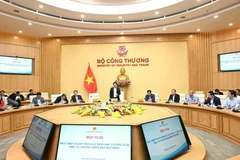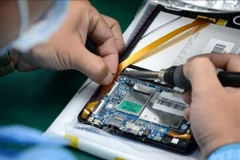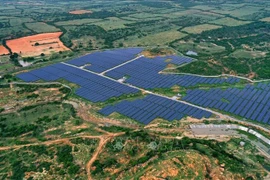Hanoi (VNA) – Vietnam’s launch of 5G mobile services last year has opened up new space for socio-economic development while marking a significant leap forward in its digital transformation journey and Industry 4.0 aspirations.
5G – big leap in technology
Viettel Military Industry and Telecoms Group (Viettel) launched commercial 5G services in October 2024, with 65,000 base stations nationwide, making the network cover industrial parks, tourist destinations, sea ports, airports, hospitals and universities. To date, some 4 million people, or 70% of its subscribers, in areas covered by Viettel's 5G services have used these services.
The rapid adoption has seen average monthly data consumption reach 21GB per 5G subscriber, or 1.7 times higher than the time of its initial rollout.
According to head of Viettel’s Technical Department Le Ba Tan, the company serves 66 million internet customers, with 10 million already owning 5G-capable devices, suggesting significant growth potential. The group will continue expanding its network to serve the increasing demand of the customers.
Major General Tao Duc Thang, Chairman and General Director of Viettel, stressed the historical significance of the achievement, stating Vietnam, for the first time, is moving in lockstep with global technological advancement, rather than playing catch-up as it did with the previous generations of mobile technology of 2G, 3G and 4G.
Vietnam has now joined an elite group of five nations which are able of manufacturing 5G network equipment, along with Sweden, Finland, China, and the Republic of Korea, he added.
The corporation’s official launch of commercial 5G services has served as a catalyst for other providers to step up their 5G commercialisation efforts, helping promote the national goal of digital transformation while providing a foundation for enterprises and organisations to apply digital technology.
VinaPhone became the second operator to introduce the services in December 2024. Meanwhile, MobiFone is poised to join the market in early 2025, having secured the necessary C3 band spectrum licence. In a strategic move to optimise deployment costs, Vinaphone and MobiFone signed a strategic agreement on infrastructure sharing with a view to increasing their coverage area by 50%.
Digital infrastructure ensuring 5G ecosystem development
Digital infrastructure is considered as a backbone for countries to boost socio-economic development and improve the living quality.
Minister of Information and Communications Nguyen Manh Hung highlighted the significance of the infrastructure, which, he said, must precede other development, requiring forward-thinking investment with a decades-long perspective.
The infrastructure must ensure ultra-wide bandwidth and be universal, sustainable, intelligent, open, green, and secure, he stated.
Director of the Authority of Telecommunications Nguyen Thanh Phuc said that digital infrastructure will create a solid basis for economic growth and social advancement, helping the country make breakthroughs in the digital era.
The impact of 5G extends beyond telecommunications. In healthcare, CEO of MedOne Digital Technology and Healthcare JSC Bui Le Ha underscored how 5G's minimal latency and superior connection capabilities are improving healthcare quality.
Meanwhile, Director of Viettel Telecom Mobile Centre Nguyen Van Son held that the enterprise is prioritising the development of fixed wireless access, ultra HD video streaming and livestreaming, remote health care, and shopping with augmented reality. A 5G ecosystem is being developed, offering businesses solutions across eight priority industries of healthcare, education, agriculture, industrial production, smart city development, energy, transportation, and logistics.
Globally, 5G subscriptions reached 2.2 billion in 2024, accounting for 26% of mobile plans. With 320 operators across 110 countries now offering 5G services that cover 55% of the world's population, analysts predict 5G traffic will surpass 4G levels from 2025, serving as a driver of economic growth.
Experts said Vietnam’s digital revolution success depends much on close coordination between service providers and technology firms to capitalise on the potential of the 5G technology, ensuring defence – security as well as cyberspace safety for socioeconomic development./.




























